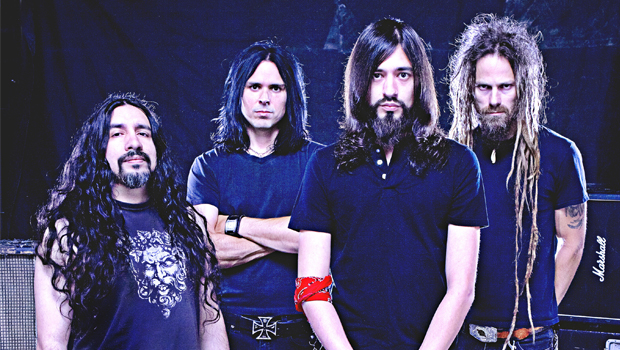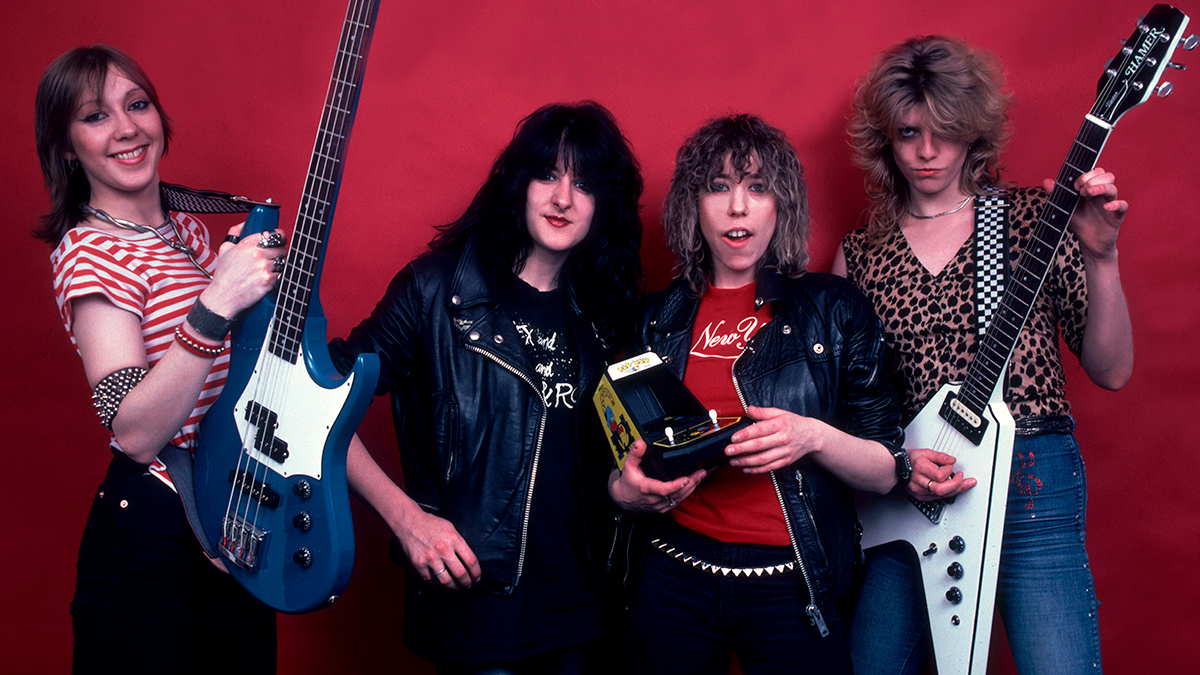
On their self-titled debut album, MonstrO -- bassist Kyle Sanders [ex-Bloodsimple], drummer Bevan Davies [ex-Bloodsimple, Danzig], guitarist Juan Montoya [ex-Torche], and vocalist and guitarist Charlie Suarez -- not only manage to combine the heaviness of Sabbath with the weirdness of Pink Floyd, they do it in a way that feels natural, unlike so many of the bands that tend to describe themselves in "We're like (band 1) meets (band 2)!" terms.
I recently caught up with MonstrO guitarists Juan Montoya and Charlie Suarez during their recent tour with The Sword and Kyuss Lives! to get the back story on the band and talk about their debut album.
Also, we're currently giving away tickets to each of MonstrO's December shows with Black Tusk, along with one of five signed copies of their new 7" single, "Anchors up!" Find out how to win right here.
So how did the band start coming together?
JUAN MONTOYA: I got together with Kyle and we spoke about getting together during one of those All Tomorrow's Parties in the UK, and it was going to be my last show with my band Torche. Right away Kyle and I started talking about getting together, and I'm really glad we did because now I'm playing with guys that are so dynamic; their musicianship is excellent.
How soon after that did the songs start coming together?
JUAN: Me, Kyle and Bevan [Davies, drummer] started jamming right after that and we had at least 7 or 8 songs that sounded pretty tight, pretty excentric instrumentally, but we definitely wanted a vocalist, to do a full rock band.
All the latest guitar news, interviews, lessons, reviews, deals and more, direct to your inbox!
I'm old friends with Charlie. Charlie's a good friend of mine from Miami. I heard a demo of him singing, and I'd always known him as an excellent guitarist -- a pedal-head like I am, great taste in music -- but when I heard him singing I'm like, "Dude, sing for us!" So I sent him some music.
CHARLIE: The singing thing was very new to me. The only reason I only attempted to sing was out of boredom. My old band had fallen apart, and I had a lot of gear so I just started writing songs -- playing bass and guitar and shitty drums -- for lack of having people to play with in Miami. So I said, "I'm just going to sing, I'm going to give it a shot," and I guess Juan heard it and asked me if I wanted to try out. And they kept sending me stuff. I would bring the songs into Garage Band and sing into my laptop mic.
And they just kept asking for more stuff. I didn't really expect this to come of it, I was just sitting in my room kind of bummed about my old band. Almost ready to give up, you know? But when I saw what was coming out of it I thought, "Why not give it a shot?" I'm very green to the whole vocal thing still, but here we are today!
JUAN: We wanted someone with great taste in music, good melody -- we didn't want a screamer. We wanted someone to make the songs sound grandiose and give 'em the beef that they need, but also be very melodic. That's what I like, the sweet with the sour, the heavy with the euophoric.
You mentioned great taste in music being important. Who are some of the bigger influences on you guys, the guys who first got you interested in being musicians?
CHARLIE: A lot of Guns N' Roses, a lot of Floyd, I got into it at a younger age with my sister being older and into Bon Jovi and Skid Row and things like that. I tried to play all the fast stuff, but I realized pretty quickly that I didn't want to do that.
And then from that came your Nirvana and all that other stuff. From there, I learned how to write songs as opposed to just shredding away like crazy.
JUAN: I started getting my first records when I was 7 years old. My mom had a friend that had a 16-year-old son and I went through his record collection and saw Sabbath Bloody Sabbath, Cat Scratch Fever -- and he hooked me up with my first Kiss records. I remember reading the back of the Kiss records and it saying, "Kiss uses Gibson guitars," and that's what got me into Les Pauls and Explorers.
And of course guitarists like Jimmy Page and Jimi Hendrix, but then I also got into more avant garde stuff -- Sonic Youth, Bill Frisell. I was listening to a lot of psychedelic bands and some stuff that doesn't even involve guitars like Dead Can Dance and Aphex Twin -- his sense of melody and ability to make it chaotic at the same time, I think that's brilliant.
You guys definitely found a way to balance out heavy and melodic on this album...
JUAN: I think heaviness is in the tension of the music -- how slowly you approach it, how softly you build it. When you build up to something like that it sounds three times as big. It's in the band dynamics. Led Zeppelin did that. Jimmy Page and Robert Plant just wound each other up to create this incredible sound.
You're tuned down a bit on "Stallone," what tuning is that?
JUAN: I would hear songs like "Boris" from the Melvis and I would be like, "How the hell is he making the room rumble like that just from the guitar alone?" And he tuned the Low E down to A, that's how he got it so heavy. I had messed with the tuning before, and it sounds great for heavy stuff but not a lot of guitars can handle that. We'd have to open up the nut and pull the intonation all the way back -- and sometimes you can't even get it intonated, unless it was a baritone guitar. But it sounds great; it gives it this amazing, chorusy effect.
And there's parts of it that sound like Sonic Youth, which I like. Two guitars slightly out of tune gives you this really cool, kind of rubbery tension.
What kind of guitars were you using on the album?
CHARLIE: We used a lot of Gibsons, old and new. Some old Fenders.
It definitely sounds like you guys have a lot of cool delays going as well, run me through your pedalboard.
CHARLIE: A lot of delays. Lots of analog effects. As far as my pedalboard goes I've got a Maxon AD-999, there's a Fuzz Factory in there, some Univibes, a new Redwitch Titan which is killer, a LovePedal Gen 5 -- these are all just delays right now [laughs]Then there's a Q-Zone, which gives me kind of a sitar sound that I really dig. A Redwitch Fuzz God. And then there's Juan which is a whole other story.JUAN: Yeah, I've been using a couple of modded DS-1s, which I remember seeing Steve Vai do before I knew what mods were, and I was like, "Why's he playing that $39.99 pedal?" [laughs] I have a Keeley mod that's really cool and then I have a secret, a DS-1 that I found for $20 that sounds better than everything else I have. Sonny Simpson, this guy from D.C, I'm using his Bluebeard pedal -- he goes under Sanford & Sonny, that's his company. That alone makes it awesome!I've got an Eddie Van Halen phaser which is great. Secret weapons are like the Verbzilla, and I've got a DL-4 which I've had ever since it came out. One of the cooler parts on the whole album is on "Olympia," where there's a clean guitar part that sounds very circular in a hypnotic kind of way. Are you getting that using some sort of delay?JUAN: I think that's definitely the My Bloody Valentine influence. I borrowed Charlie's Les Paul with a Bigsby for that -- just play the note and then slightly pitch-bend it, which makes it sound like you're recording on analog tape and just slowing it and speeding it up. It gives it this nice wavy effect that's just the most beautiful sound to your ears, I think.All that British shoegaze stuff is definitely incorporated in the album.I feel like the track listing is pretty essential to this record. The album starts out with one of the shortest, punchiest numbers and then ends with two of the more mellow tracks on the album.JUAN: Yeah, it's kind of weird. William [Duvall, producer] had a lot of input on that. He saw it as a cool thing. I think it takes you on a trip and to have the last songs be out there in outer space, it's kind of like a voyage.CHARLIE: We mapped it out. We definitely knew, as Juan described in another interview, on a rollercoaster; it goes up and down, definitely not straight ahead because that would be the most boring thing ever. We start off with this intense punch in the face and then "Anchors Up!" is still driving, but gets kind of spacey, so you get an indication of where we might be taking this. We definitely knew that we wanted to experiment with dynamics not just within the songs but with the album, with song placement.Do you guys get a chance to write much while on the roadJUAN: We're always brewing stuff up. I brought an acoustic with me, which I should be taking out more often. I'm spending a lot of time catching up with old friends and getting to know the guys in the other bands. This is my third tour with the Sword.Charlie's the green one though, this is his first big tour so he's all excited. He takes pictures of everything. [laughs]How's your first tour been? Any tough lessons you've learned in your short time on the road?CHARLIE: Well, no. You just can't party like you used to. I used to be in another band that did some touring, but it wasn't anything like this. I was a reckless mess back then and it didn't really matter because I was just playing guitar. Now I have to take care of my throat, I have to watch my diet, I have to do these new things... it's a job now, instead of just something to do because I don't want to work 9-5.I do still catch myself doing stuff... like after sets, I'll introduce the band one more time, "We'r MonstrO from Atlanta, Georgia. Stick around because the Sword are next!" Like, where are they going?[laughter]They paid what, $30-40 to be here? It's not like in the old days where your friends band plays and you're outside smoking cigarettes. These people are here from beginning to end.MonstrO are currently on tour with Black Tusk in support of their self-titled debut album. You can find a full list of tour dates and enter to win tickets to see them live in December or a signed 7' of their new single, "Anchors Up!" right here.
Josh Hart is a former web producer and staff writer for Guitar World and Guitar Aficionado magazines (2010–2012). He has since pursued writing fiction under various pseudonyms while exploring the technical underpinnings of journalism, now serving as a senior software engineer for The Seattle Times.

